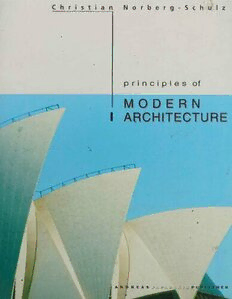
Principles of Modern Architecture PDF
72 Pages·2000·20.702 MB·English
Most books are stored in the elastic cloud where traffic is expensive. For this reason, we have a limit on daily download.
Preview Principles of Modern Architecture
Description:
Principles of Modern Architecture is not a history of modern architecture. Its aim is theoretical and it represents an attempt to explain the basic tenets of the new architecture that came into being around the turn of the century. The many misunderstandings currently in circulation make such an attempt a timely one. Modern architecture answers to the spatiality of the open world. Pre-modern currents, such as Art Nouveau and new building technology, paved the way for Le Corbusier's concept of the free planâ in 1926, later supplemented by Mies van der Rohe's idea of clear construction. It became a movement with the institution of the CIAM (Congrès International d'Architecture Moderne) in 1928 and has remained the only true expression of the open world of pluralism and global interaction. In this volume Christian Norberg-Schulz investigates the basic principles of modern architecture including the free plan and the open form, as well as the manifestations of modern life in the terms house, institution, and city. He also discusses the problems of regionalism and monumentality (meaning), and concludes by summing up the endeavours of modern architecture. It is a clear, concise, accessible account of what the modern movement wanted and achieved by one of the world's leading architectural critics.
See more
The list of books you might like
Most books are stored in the elastic cloud where traffic is expensive. For this reason, we have a limit on daily download.
